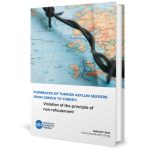Sweden may have quietly agreed to disrupt the activities of Turkish journalists living in exile within its borders in exchange for the release of detained Swedish journalist Joakim Medin, Blankspot.se, a Swedish news website, reported, citing explosive claims by a veteran intelligence source
Blankspot details claims from a verified intelligence contact with decades of experience in the Middle East. The source says a senior official from Turkey’s National Intelligence Organization (MİT) indicated that Medin’s release followed a covert, informal arrangement with Swedish security officials, specifically, that Sweden would “disturb” individuals Turkey considers hostile.
Medin, a reporter for the Swedish newspaper Dagens ETC, was detained upon arrival in İstanbul on March 27. He had traveled to cover protests sparked by the March 19 detention of İstanbul Mayor Ekrem İmamoğlu, President Recep Tayyip Erdoğan’s main political opponent. The reporter, who was subsequently arrested on charges of terrorism as well as insulting Erdoğan, was released pending trial on May 16, fueling speculation about a possible quid pro quo between the Turkish and Swedish governments.
Swedish officials, however, have denied that any quid pro quo took place. At a press conference on May 17, Minister for Foreign Affairs Maria Malmer Stenergard rejected the notion of a deal tied to Medin’s release, while acknowledging general intelligence cooperation with Turkey.
Among those named in this context was Abdullah Bozkurt, a Turkish journalist living in exile in Sweden and editor of Nordic Monitor, a Stockholm-based investigative platform critical of Ankara.
Bozkurt, who co-founded Nordic Monitor in 2019 with journalist Levent Kenez, has become a central target of Turkish state media and intelligence. His platform has published extensive documentation on President Recep Tayyip Erdoğan’s authoritarian governance and MİT’s transnational repression, including surveillance, harassment and abductions of dissidents abroad.
In public forums and private negotiations, Turkish officials have persistently sought to silence Nordic Monitor. During Sweden’s NATO accession process, Turkey reportedly demanded the platform be shut down as a condition for supporting membership. In November 2023, then-deputy foreign minister Burak Akçapar told Turkish lawmakers that closing Nordic Monitor was actively discussed during negotiations and implied those efforts would continue even after Sweden joined the alliance.
Bozkurt’s reporting has come at personal cost. In 2020 he was physically attacked outside his home in Stockholm. His protected residential address was later leaked to Sabah, a pro-government Turkish newspaper, along with covert photos of Kenez. Turkish media have also circulated fabricated accusations, including claims unsupported by legal indictments that Bozkurt was linked to the 2016 assassination of Russian Ambassador Andrei Karlov.
Senior Turkish officials have ramped up threats. In 2016 government-aligned pundit Cem Küçük said on live TV that Bozkurt should be assassinated by MİT. In 2021 a top presidential advisor, Prof. Dr. Mesut Hakkı Caşın, ominously remarked on CNN Türk: “MİT will find him. Whether they feed him to the fish or the sharks, I don’t know. But traitors all meet the same end.”
Journalist associations in Sweden and Europe have condemned the threats. The European Federation of Journalists (EFJ) called Turkey’s actions “political blackmail” aimed at silencing independent media abroad. Bozkurt and Kenez’s cases have been flagged by the Council of Europe’s platform for the protection of journalism.
Also mentioned by Turkish intelligence in this context, according to the source, were Shiyar Ali, a representative of the Kurdish Democratic Union Party (PYD) in Syria — an entity designated as a terrorist organization by Turkey — and a Swedish diplomat who had previously testified on Ali’s behalf. Both were briefly detained by Swedish security services shortly before Medin’s release.
This is not the first time Sweden has faced accusations of yielding to Ankara’s political demands. A previous investigation by Dagens ETC revealed that Swedish authorities had quietly altered immigration procedures to delay or deny asylum and residency to Turkish dissidents linked to the faith-based Gülen movement. According to leaked documents accessed by the journalists, the changes were made in an apparent effort to preserve diplomatic relations with Turkey during NATO negotiations.
Turkish President Recep Tayyip Erdoğan has been targeting followers of the Gülen movement, inspired by the late Muslim cleric Fethullah Gülen, since the corruption investigations of 2013, which implicated then-prime minister Erdoğan, his family members and inner circle.
Dismissing the investigations as a Gülenist coup and conspiracy against his government, Erdoğan designated the movement as a terrorist organization and began targeting its members. He intensified the crackdown on the movement following an abortive putsch in 2016, which he accused Gülen of masterminding.
The movement strongly denies involvement in the coup attempt or any terrorist activity.















